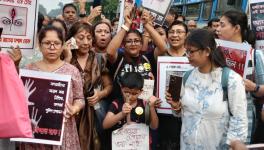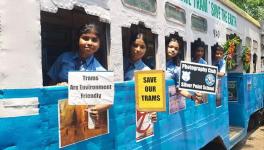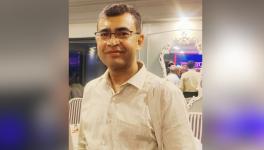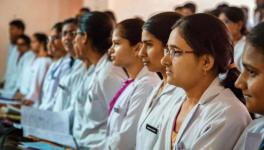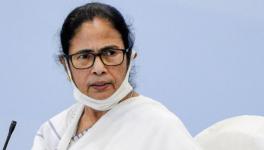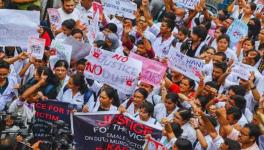RG Kar Hospital Murder Ignites Bengal’s Fight for Justice
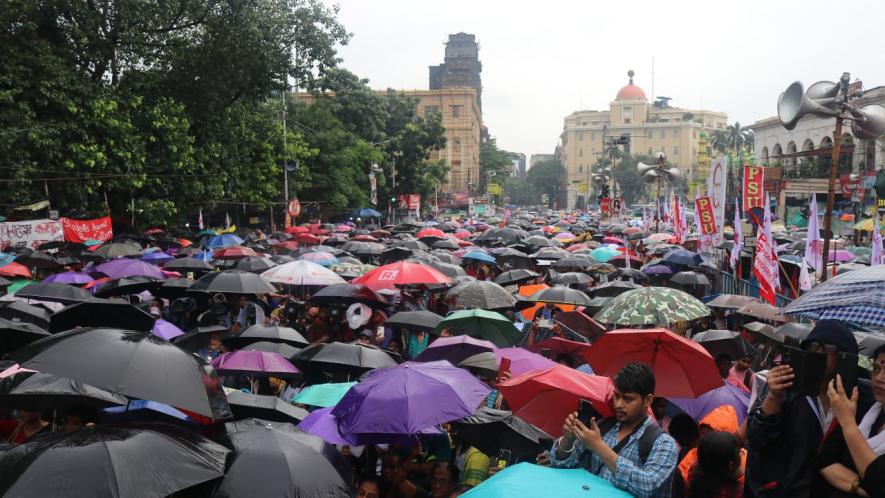
Rally amid the rains by Left-wing organisations SFI, DYFI, AIDWA at Dharmatala on September 26.
The brutal killing last month of post-graduate medical student Tilottama (so named by the protesting doctors) at R.G. Kar Medical College and Hospital in Kolkata has exposed not only the flaws within West Bengal’s medical education and healthcare systems, but also widespread corruption within the state administration. The tragic incident has brought to light the oppressive and threatening atmosphere under which the Trinamool Congress-led (TMC) state government has been operating, often through alleged inducements or direct political and administrative coercion.
The murder of Tilottama, while on duty, within the hospital premises, has ignited the collective conscience of the people of Bengal. A unified cry for justice is reverberating across the state: “I want justice, you want justice, we all want justice.”
Not since the post-Independence period, or may be even during various stages of the Independence movement, has Bengal witnessed such an intense public outcry against the ruling government, irrespective of political affiliation. People have taken to the streets in support of the junior doctors’ movement, demanding exemplary punishment for those responsible for Tilottama’s murder and for those complicit in concealing the truth.
August 9 onward (the day the murder was reported), for over 42 days, millions of people across Bengal have participated in daily protests—marching in torrential rain, staying awake through the night in urban centres, semi-urban areas, and remote villages. Remarkably, women from all walks of life have played a pivotal role in this movement. From schoolgirls to university students, housewives to octogenarians, many of whom had never participated in protests, have fearlessly taken to the streets, demanding justice and a Bengal free from fear. This message of defiance has resonated not only across India but around the world, sparking solidarity protests.
The TMC government, overwhelmed by the intensity of the protests, faced mounting pressure. A significant moment came when agitating junior doctors marched to the Kolkata Police headquarters at Lalbazar, where they stayed for 17 hours. Kolkata Police Commissioner Vineet Goyal was presented a memorandum demanding his resignation, symbolised by a spine placed on his desk—an emblematic call for the state administration to "stand tall" and uphold justice.
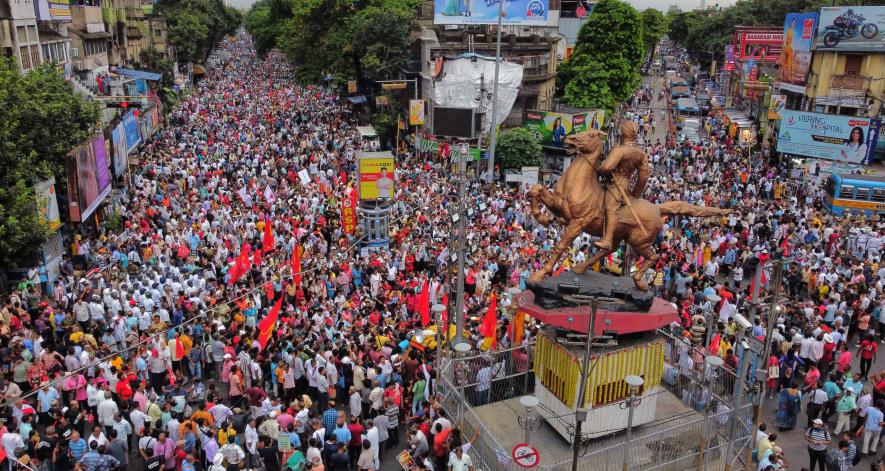
A 'Justice for Tilottama' rally at Shyambazar Panchmatha in Kolkata.
Despite the ruling party’s attempts to crush and divide the movement through intimidation and persuasion, the people remained undeterred. Ultimately, Chief Minister Mamata Banerjee was forced to accept the junior doctors’ five-point demands. Although the junior doctors have resumed work, they have made it clear that all decisions agreed upon in discussions with the government, in the presence of the Chief Minister, must be swiftly implemented. Additionally, the movement continues, with daily protests across the state calling for strict punishment for Tilottama’s killers.
The fight for a fearless Bengal carries on, with protests and demonstrations unfolding every day throughout the state.
Corruption, Fear Grip Medical Education, Health System
"Corruption has not only taken root but has become institutionalised within Bengal's medical education and healthcare systems. It is now a thriving industry, sustained and spread across all levels through autocratic oppression. The death of the medical student at R.G. Kar Medical College and Hospital is, in fact, state-sponsored murder," said Arunava Ganguli, a film director and convenor of the "Aakranto Aamra" Bengal state committee.
For over a decade, West Bengal has been trapped in an environment of fear and systemic corruption. From the Sarada chit fund scam to the Narada sting operation, the public has alleged blatant bribery and malfeasance of ruling party representatives and leaders. Corruption has pervaded every sector, including education and food departments, with the accused ministers and officials now behind bars. Additionally, cases of cattle smuggling, sand, and coal rackets have come to light.
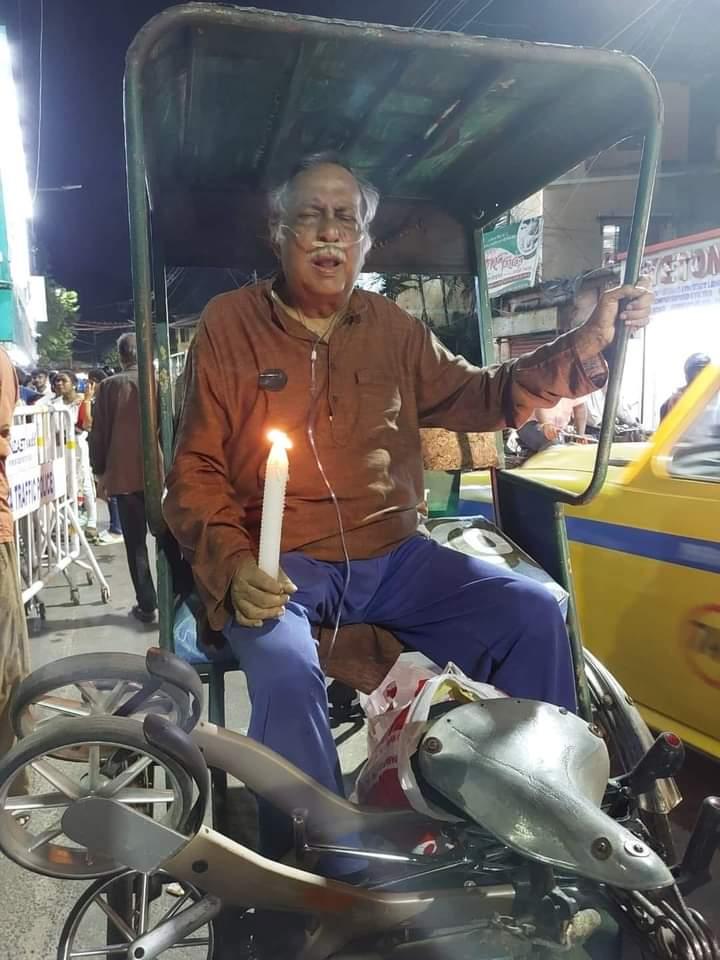
An old man in Kolkata holding a candle and demanding justice for Tilottama’s rape-murder
However, these scandals pale in comparison to the deep-seated corruption within the state's medical education and healthcare systems. According to several doctors and healthcare workers in government hospitals, what has surfaced so far is only the tip of the iceberg. They allege that Tilottama’s murder was orchestrated by this “very corrupt syndicate.”
Several doctors alleged that since the TMC came to power (in 2011), party leaders Nirmal Maji, MLA, and former Rajya Sabha member Santanu Sen have formed two factions vying for influence over the state’s healthcare system. The health sector operates according to their interests, the alleged. A cold war has also emerged between these two TMC leaders, as each seeks full control over the system. Ironically, since the TMC assumed power, Bengal has not appointed a dedicated health minister—Chief Minister Mamata Banerjee holds the portfolio herself, with all decisions emanating directly from her office.
Doctors from across the state alleged that since the onset of the COVID-19 pandemic in 2020, TMC’s interference in medical education and the healthcare sector has intensified. Maji and Sen’s influence significantly diminished as a new group, dubbed the "North Bengal Lobby," assumed control, they allege. This group, led by Dr. Shamapada Das, who once treated the Chief Minister at his clinic in Kalighat, rapidly consolidated power within the health system. Other prominent figures said to be part of this faction include Dr.Sudipta Ray, Dr. Avik Dey, Dr. Burupaksha Biswas, and Dr. Susanta Ray, many of whom graduated from North Bengal Medical College.
Dr. Ray, an MLA from Srirampur, holds multiple key positions, including Chairman of the West Bengal Medical Council, the State Health Recruitment Board, and the Rogi KalyanSamity (Patient Welfare Committee) of R.G. Kar Medical College Hospital. This concentration of political power within the health sector has raised concerns among many, including Dr. Tamonas Choudhury, a renowned Kolkata surgeon, who has questioned “overwhelming political influence” in the state’s healthcare system.
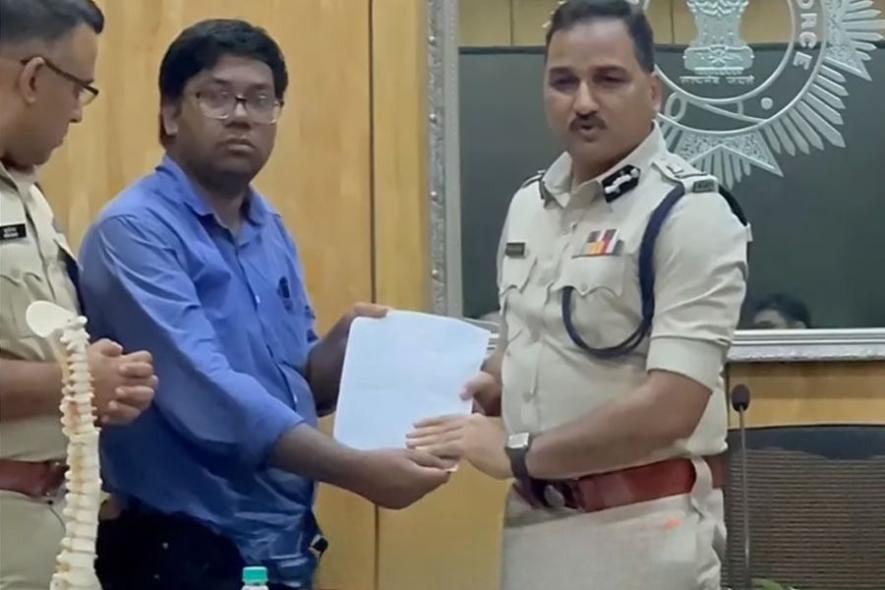
Kolkata Police Commissioner Vineet Goyal being given a memorandum demanding his resignation, symbolised by a spine placed on his desk.
The situation worsened during the pandemic, with numerous allegations of financial misconduct. Dr. Susanta Ray, Vice Chairman of the West Bengal Medical Council, was appointed as the state’s Officer on Special Duty (OSD) during COVID-19, overseeing pandemic-related healthcare initiatives. However, his tenure was marred by accusations of financial fraud and misappropriation of funds intended for pandemic relief efforts. Jalpaiguri’s Dr Ankur Das has publicly accused Dr. Ray of corruption related to COVID-19 expenses.
In response to the mounting allegations, the government formed a one-man investigative committee, headed by former Chief Secretary and current Chief Advisor to the Chief Minister, Alapan Bandopadhyay. Yet, more than two years later, the complaints remain unaddressed, as noted by Dr. Utpal Banerjee, general secretary, West Bengal Health Services Doctors' Association.
Furthermore, the West Bengal University of Health Sciences, under the leadership of Vice Chancellor Dr Suhrita Pal, has also been embroiled in an alleged scam. Over the past four years, there have been repeated incidents of question papers and answer sheets being leaked and sold for large sums of money. The Trinamool Chhatra Parishad (TMC’s student wing) has been accused of spearheading these illegal activities in medical colleges.
"There is a nexus between the Health Department, the Medical Council, the West Bengal University of Health Sciences, and the Health Recruitment Board—all operating under a political mastermind, driven by corruption," alleged Dr Choudhury.
Dr Suhrita Pal is also under scrutiny for allegedly referring the digitisation of all data related to outpatient departments (OPD), birth and death certificates, patient discharges, and other sensitive information to her son's company, Hacko Mate. This venture has been implicated in widespread corruption, currently under investigation by the Central Bureau of Investigation (CBI).
This alarming confluence of political influence, corruption and fear continues to erode the integrity of Bengal’s medical education and healthcare systems, leaving a once-thriving sector in disarray.
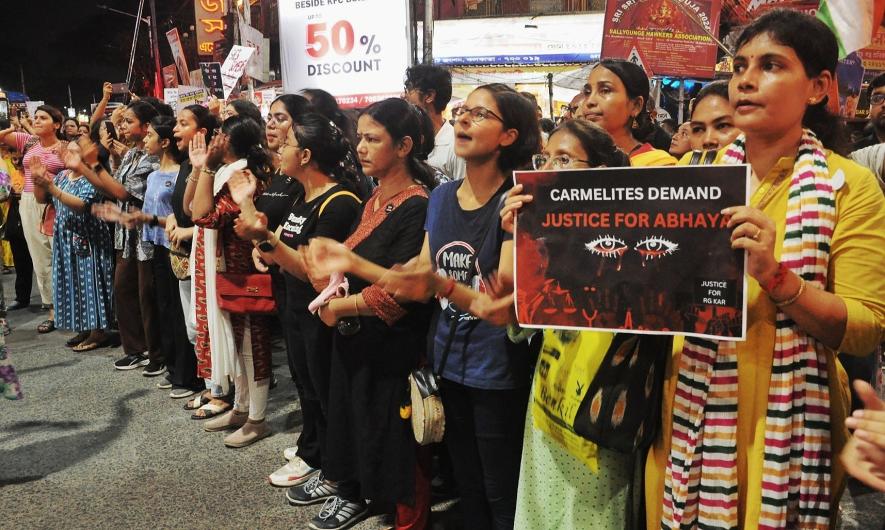
Another protest rally in Kolkata.
Many doctors in Kolkata have raised concerns that R.G. Kar Medical College and Hospital had become a hub for various corrupt practices. Former Principal Sandeep Ghose is believed to have spearheaded these operations.
Health workers and doctors alleged that biomedical waste—such as gloves, oxygen masks, injection syringes, and other materials—were being packed and smuggled out of the hospital. These materials were stored in a warehouse called Lalkuthir in Bantola, Kolkata, where they were recycled and resold, posing a serious threat to patients who unknowingly used them again. Allegations have also emerged regarding the purchase of medicines. For instance, medicines worth ₹60 lakh were recently purchased from a shop in Rishra, Hooghly District, for R.G. Kar’s chest medicine department, where Tilottama, a postgraduate student, was studying.
More alarmingly, accusations of smuggling human organs and unclaimed bodies have surfaced. A year and a half ago, Deputy Superintendent (non-medical) of R.G. Kar Hospital, Aaktar Aali, filed a complaint against the former Principal, Sandeep Ghose, accusing him of rape and implicating him in these corrupt activities. The Anti-Corruption Bureau requested Narayan Swarup Nigam to investigate the matter immediately, but the file remains untouched. Aali was subsequently transferred to Baharampur.
Corruption within the medical education system is also widespread. Many junior doctors and interns from various medical colleges, including R.G. Kar, Bardhaman, Uttar Banga, Malda, and Sagar Dutta, have reportedly been asked to pay exorbitant amounts of money to receive their doctor registration certificates and post-graduate thesis approvals.
Junior doctors Aniket Mahato and Mojammem Haque told this writer that corruption had infiltrated every level of the system. Several Bachelor of Medicine and Bachelor of Surgery (MBBS) students allegedly received honours in exchange for money, a practice that reportedly began after 2020, they alleged. This raises serious concerns about the qualifications of those who have graduated during this period.
They also alleged that those who opposed this corruption were denied registration. One such example is Chandra Mouli Jha, a student of R.G. Kar Medical College, who completed his internship in 2021 but received his registration certificate only six months ago following an order from the Kolkata High Court.
The intimidation tactics employed by the corrupt syndicate have created a culture of fear, with junior doctors from R.G. Kar, Bardhaman, Uttar Banga, Bankura, and Medinipur alleging that female students were often coerced into attending gatherings organised In a disturbing development, three male students and one female student from R.G. Kar Medical College reportedly died under mysterious circumstances, with authorities attributing the deaths to suicide.
Another pressing issue is the absence of student union elections in medical colleges across Bengal for the past decade. The Trinamool Chhatra Parishad has dominated these unions, and there has been no audit of the large sums of money spent on student festivals each year. Many junior doctors are uncertain whether they will receive house staff positions after completing their internships. “An internship completion doesn’t guarantee house staffship unless one satisfies the demands of the syndicate,” said Nomita Saha, a junior doctor at Bardhaman Medical College.
Additionally, Ashis Pandey, a TCP leader at R.G. Kar, has been reportedly been drawing a salary as a house staff member but has reportedly never fulfilled his duties. This has raised questions about whether the state’s health ministry, led by the Chief Minister, is even aware of such blatant misconduct. Pandey is currently under investigation by the CBI.
The state’s medical infrastructure is in dire straits. While there are now 26 medical colleges in Bengal—up from just 10 during the Left Front government’s tenure—many of the newer institutions were converted from district hospitals and lack the necessary infrastructure, faculty, and patients.
Several private medical colleges have also been established, but their teaching facilities are woefully inadequate. Allegations suggest that permission to open these new medical colleges, especially private ones in Bajbaj, Naihati, and Bolpur, was granted in exchange for huge bribes, bypassing proper infrastructure requirements.
Furthermore, no General Duty Medical Officers or health staff have been appointed in state-run hospitals for a long time, leaving large sections of Bengal's population without adequate healthcare.
The Brutal Rape-Murder
On the morning of August 9, the bloodied body of Tilottama, a PG medical student from R.G. Kar Medical College's Chest Department, was discovered in the department's seminar room. Since then, several troubling questions have arisen regarding her brutal rape and murder, with the hospital administration and police issuing contradictory statements and allegedly attempting to shield the culprits.
After Tilottama’s body was found, an assistant superintendent from R.G. Kar Hospital informed her family that she was unwell and urged them to come to the hospital immediately. A few minutes later, the family was told that she had committed suicide. This raises the question: why did the Principal, Medical Superintendent, and Vice Principal (MSVP) not directly inform her parents? Additionally, when the family arrived at the hospital, they were made to wait outside for approximately three hours. Why were they not allowed to see their daughter’s body? Who was present in the seminar room at the time? What were they doing? Where was the Principal during this time? Strangely, several doctors from the “North Bengal lobby” and a lawyer from a distant area arrived at the hospital shortly after. Were they informed in advance, or did someone call them?
Dr. Abhik De was present in the seminar room, and the police claimed he was a fingerprint expert. However, this statement is false, as Dr. De is not a fingerprint expert, say many of his colleagues. Why was Tilottoma’s body hurriedly placed in a car and nearly taken out of the hospital premises?
The brutal incident might never have come to light if Democratic Youth Federation of India (DYFI) leaders, including state secretary Minakshi Mukherjee, president Dhrubajyoti Saha, Kolotal Dasgupta, and other activists, had not intervened.
There were also attempts to conduct a quick post-mortem. Dr. Apurbo Biswas, a senior autopsy surgeon at R.G. Kar, reported that on that day, Sanjib Mukherjee, a TMC councillor from Panihati in North 24 Parganas (Tilottama's hometown), threatened him, saying that if the post-mortem was not done immediately, "rokto ganga baiye deoya hobe" (a river of blood will flow).
Shockingly, Tilottama’s parents were not present during the post-mortem. The procedure was conducted in the evening under immense pressure from the Kolkata police, in violation of Supreme Court directives. A TMC leader even signed the cremation papers, falsely identifying himself as a relative of Tilottama.
Tilottama’s father lodged an FIR at Tala Police Station at 11:30 p.m on August 9. During this time, it was alleged that her father and other relatives were humiliated by Officer-in-Charge Abhijit Mandal. Many are questioning why the Principal or any other official from R.G. Kar Medical College did not file the FIR.
The following day, a room adjacent to the seminar room, where patients were being treated for polysomnography (sleep disorder diagnosis), was suddenly broken down under the pretence of renovation. This sleep-related treatment was supposed to continue until morning, so why was the treatment was abruptly stopped? Was this an attempt to tamper with evidence?
Uproar in Bengal
Sanjoy Ray, a civic volunteer with the Kolkata Police, was arrested the day after the brutal rape and murder. However, many doctors and citizens across Bengal have voiced concerns that such a barbaric act could not have been committed by one person. They argue that the nature of the injuries inflicted on various parts of the victim’s body suggests involvement by individuals with anatomical expertise. There is widespread demand to identify and punish all those involved in the heinous crime.
Since the tragic incident, the people of Bengal have taken to the streets in protest. Leftist student groups, youth organisations, women’s associations, farmers, and farm labourers have united in their calls for justice. The outcry is growing louder, demanding that everyone responsible be held accountable.
The Kolkata High Court has transferred the investigation to the CBI, which has arrested former R.G. Kar Medical College principal Sandeep Ghose, Officer-in-Charge of Tala Police Station Abhijit Mandal, and is interrogating several doctors affiliated with the so-called "North Bengal lobby," as well as an MLA from Panihati. Notably, most of the individuals being scrutinised have ties with the TMC.
In this charged atmosphere, Rashtriya Swayamsevak Sangh or RSS chief Mohan Bhagwat made a statement in support of the Mamata Banerjee government. Simultaneously, Dilip Ghosh, former Bengal Bharatiya Janata Party (BJP) president and ex-MP, criticised the doctors' movement. Former Bengal minister Anjan Bera commented that whenever protests against the TMC government intensify, RSS and BJP jump to TMC's defence, which, he claims, was evident in this case, too.
On September 26 (Thursday), despite heavy rainfall, a large protest march and sit-in (dharna) were organised by the SFI, DYFI, and AIDWA at Dharmatala in Kolkata. The protesters vowed to continue their demonstrations.
Meanwhile, the Chief Minister introduced the "Aparajita Bill" in the state assembly, stating that the law aims to impose stricter punishments for such crimes. However, many in Bengal view this move as an attempt to divert attention. They argue that if the government were genuinely committed to justice, it would not have hired 34 lawyers at the state's expense to defend itself in the Supreme Court against allegations related to the administration’s role in covering up the incident.
The writer covers the Jangal Mahal region for ‘Ganashakti’ newspaper in West Bengal. The views are personal.
(All pictures taken by Madhu Sudan Chatterjee)
Get the latest reports & analysis with people's perspective on Protests, movements & deep analytical videos, discussions of the current affairs in your Telegram app. Subscribe to NewsClick's Telegram channel & get Real-Time updates on stories, as they get published on our website.











